Hands down, the most requested breakfast and brunch dish that we eat in our house is German Pancakes. They are an easy breakfast – so simple to make and require just 5 minutes of prep work. Common ingredients including eggs, milk, flour, and vanilla are blended together and baked with butter. Typically, we serve ours with lemon juice and powdered sugar sprinkled over the top of the german pancake; we also add berries on the side.
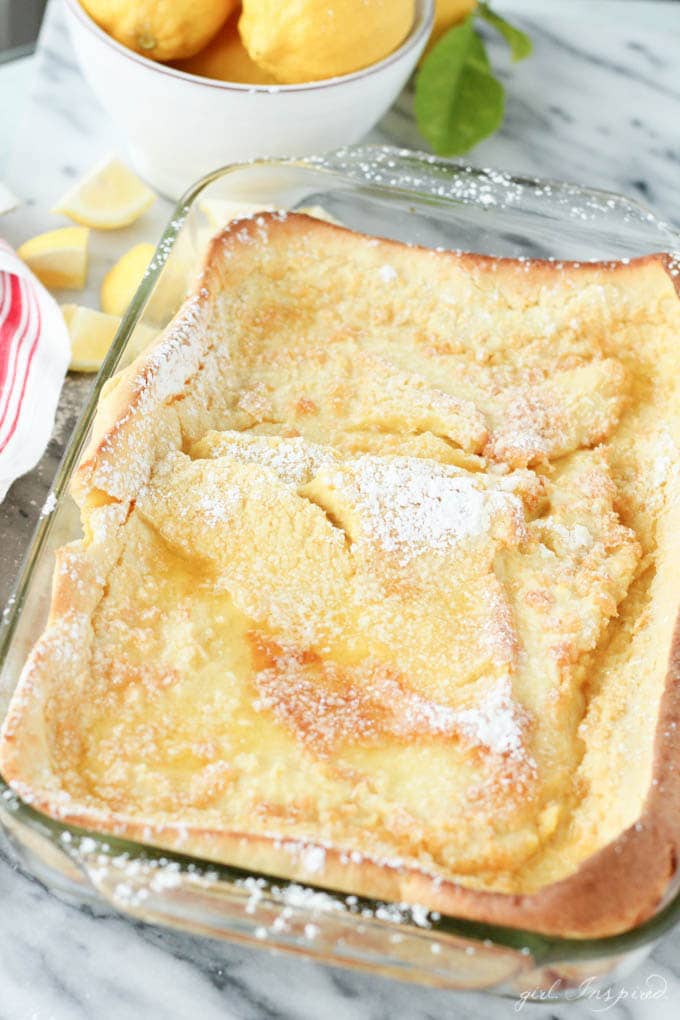
The pancake cooks up so gorgeous – with big, puffy golden brown edges and buttery crispiness across the top. It uses simple ingredients and takes about 30 minutes to bake – you’ll know it’s done when the edges are puffy and deep, golden brown. Unfortunately, the pancake falls some within a few minutes of removing it from the oven, but it still looks cool and the best part is eating it, anyhow!
It makes a lovely addition to the common French Toast or blueberry pancakes with maple syrup rotation. Growing up, my mom would bake these puffy oven pancakes for special occasions like a Sunday morning or Christmas morning and this has become one of our favorite breakfast recipes of all time.
Nearly every weekend and sometimes on a good weekday, my husband makes German Oven Pancakes for the kiddos. Sometimes we spring for a breakfast casserole like this Cheesy Egg Bake or absolutely scrumptious Breakfast Crepes, but our favorite is this puff pancake recipe.
Jump to:
German Pancake Recipe Video
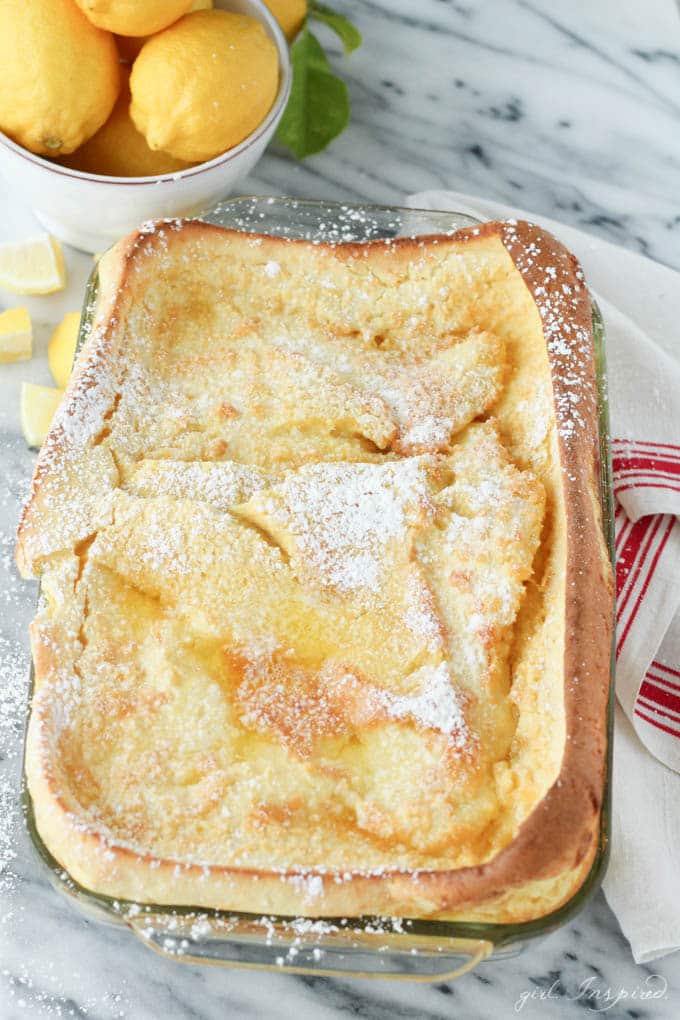
🥞 Ingredients:
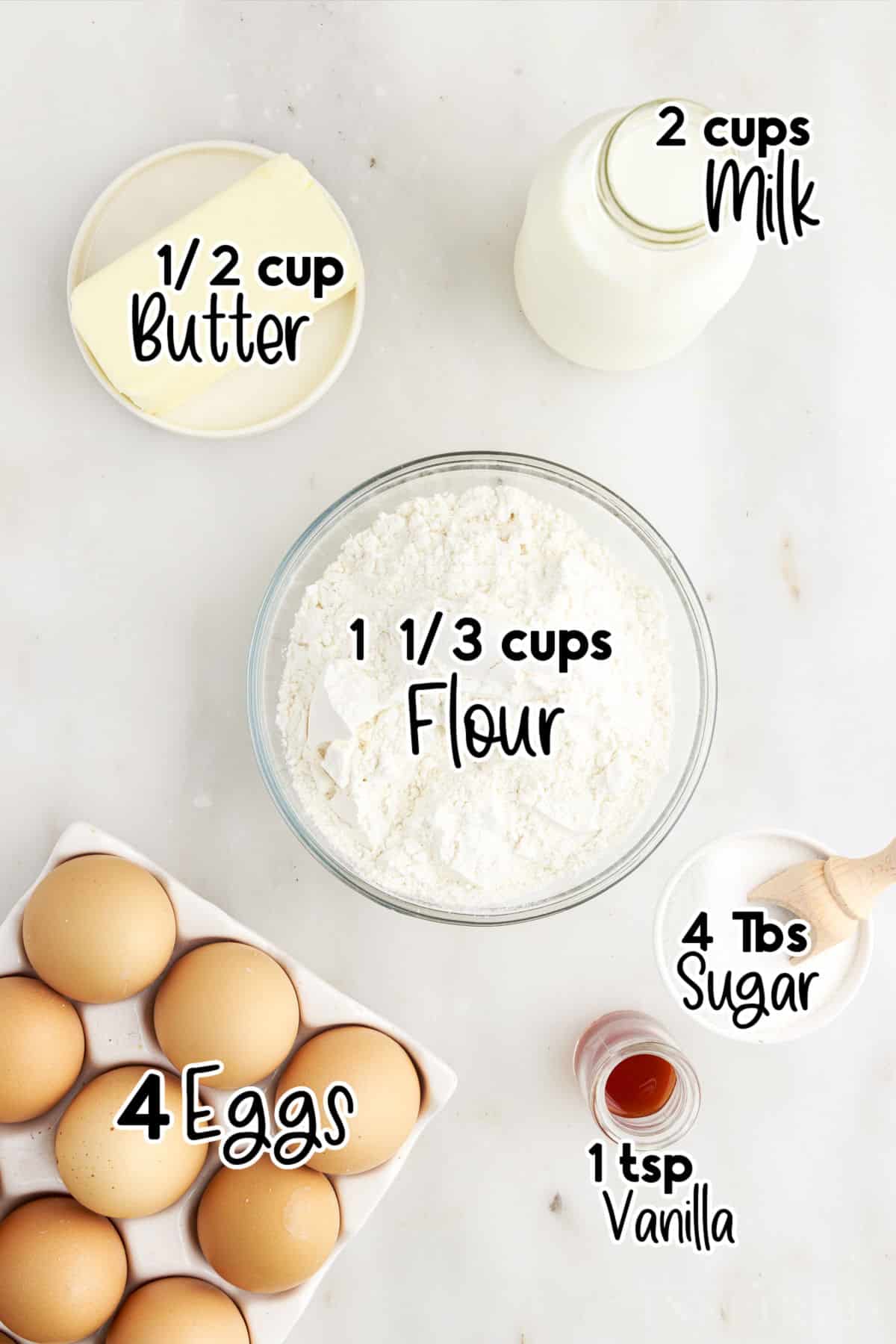
- whole milk – 2% or even nonfat milk can be substituted
- eggs – room temperature eggs will incorporate more air during blending and result in a greater puff pancake.
- vanilla extract – the vanilla compliments the subtle sweetness of the German pancake
- all-purpose flour – There is a relatively small amount of flour in the recipe. As discussed, a gluten-free flour mixture can be substituted, but the gluten in the flour adds to the overall lift of the pancake.
- sugar – The sugar sweetens the pancake a bit. You can omit the sugar for a more savory German pancake.
- butter – salted or unsalted butter will work here. This recipe is heavy on the butter, resulting in an indulgent and delicious pancake. You can reduce the amount of butter with no change to the texture of the dish.
For a full list of ingredients and their measurements, 📋 please view my printable recipe card at the bottom of the post.
Optional Garnish:
Lemon juice, maple syrup, powdered sugar, raspberries, blueberries, a strawberry syrup, passion fruit syrup, sliced apples, toasted nuts – all of these options are delicious.
Substitutions and Variations
- Gluten-free German pancakes – As detailed below in the FAQ section, simply swap gluten-free flour mix for the all-purpose flour in the recipe and your oven pancakes will turn out delicious, albeit with a little less puff.
- Butter – Reduce the butter to anywhere from 2 tablespoons up to the indicated 8. The pancake will cook up the same, though the buttery deliciousness of these dutch baby pancakes will not be there.
- Add sliced fruit to the bottom of the baking dish to cook inside the pancake. Apples are a popular choice.
- Melt the butter in a large cast iron skillet, pour the batter into the hot skillet, and transfer to the oven to bake. Depending on the size of your skillet, you may need to halve the batter ingredients.
🔪 Instructions:
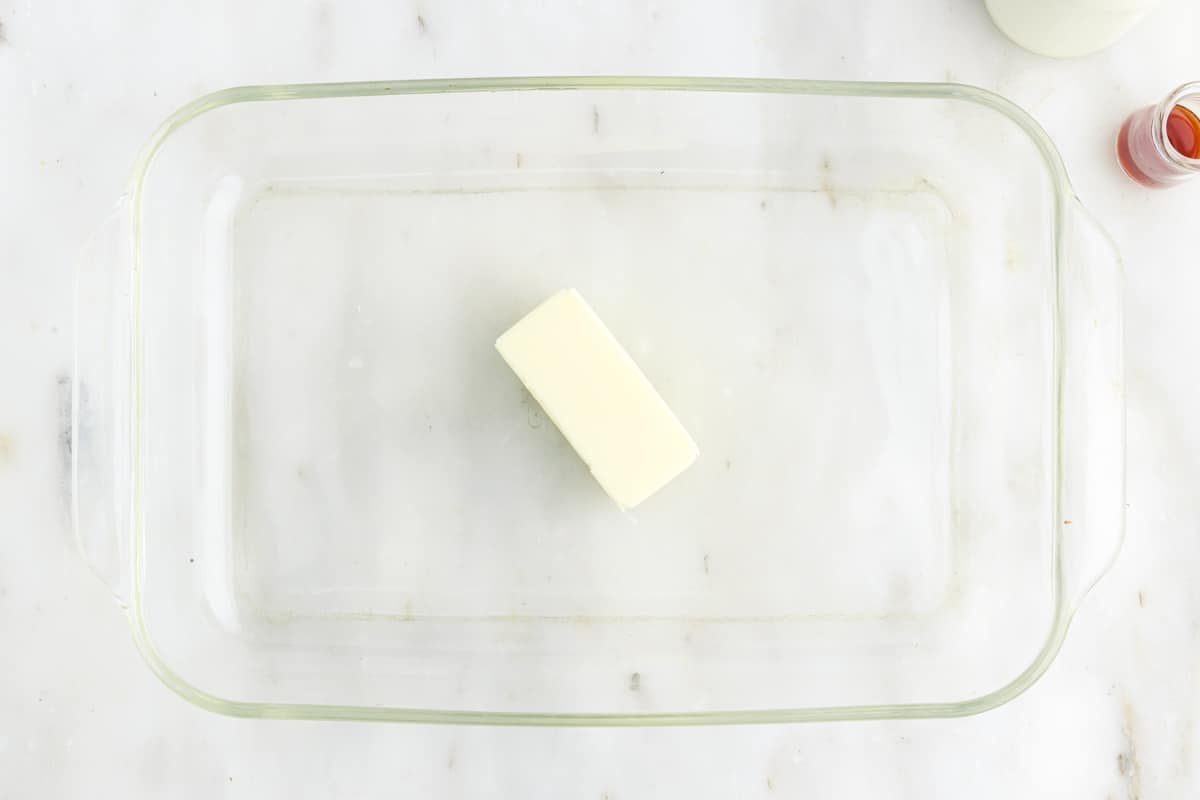
Step 1: Turn on the oven to 400 degrees and place a stick of butter (½ c.) in a 13 x 9 inch glass casserole dish; place the pan with butter in the oven while it’s heating. I find that the butter melts more quickly if you cut it into several pieces before placing in the oven.
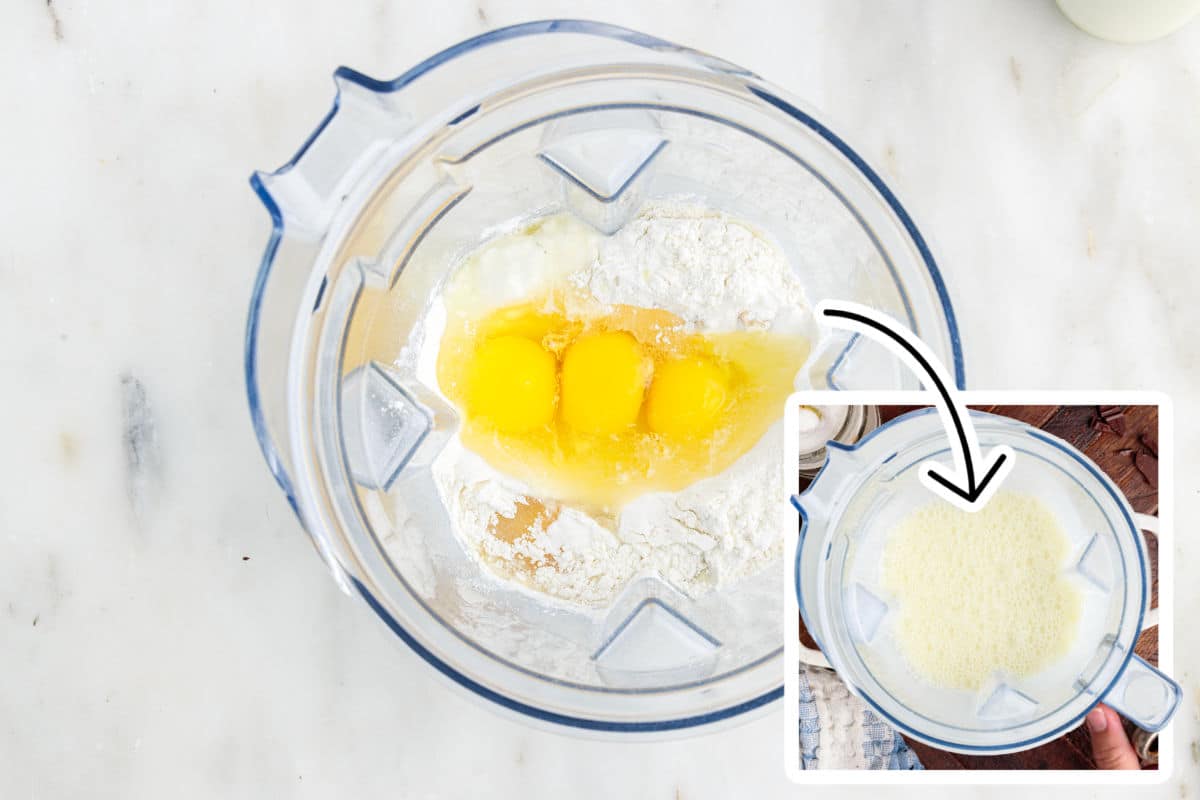
Step 2: While the butter is melting in the oven and the baking dish is heating, mix all the other ingredients, milk, eggs, flour, vanilla extract, and sugar together in a blender.
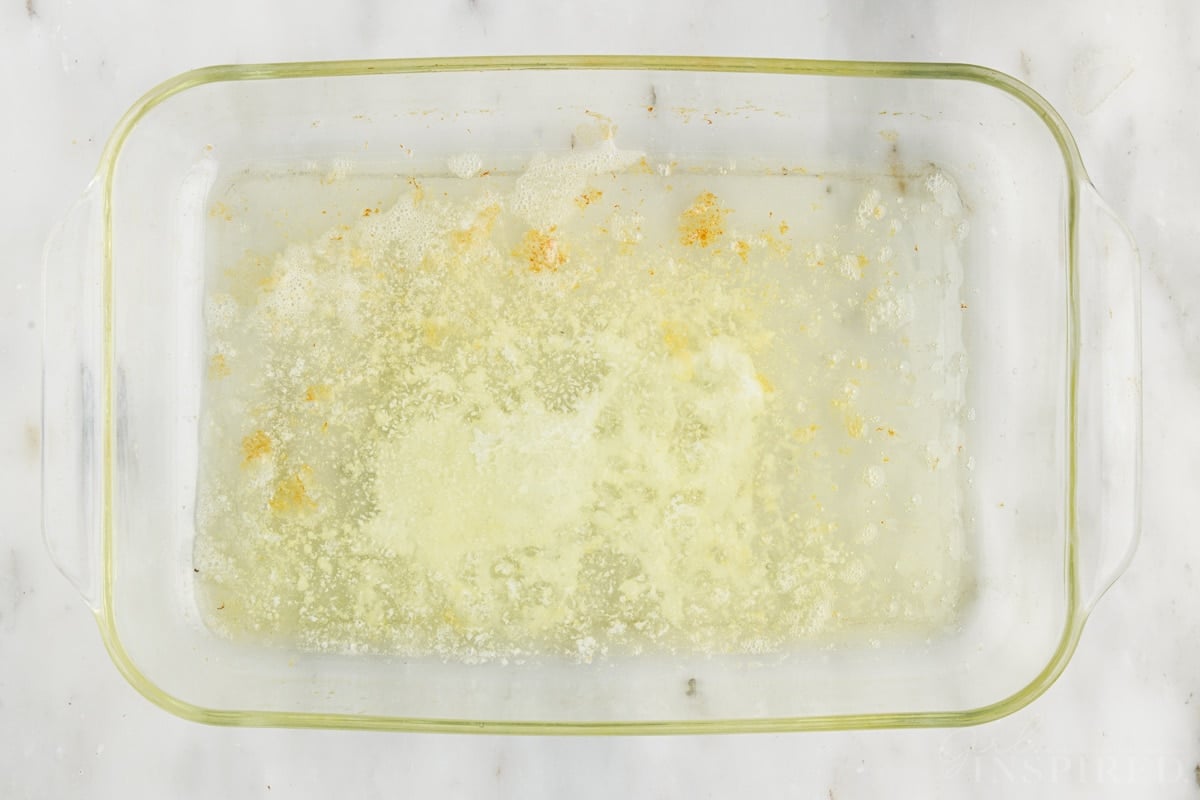
Step 3: Wait until the butter has completely melted AND the oven has reached 400°F.
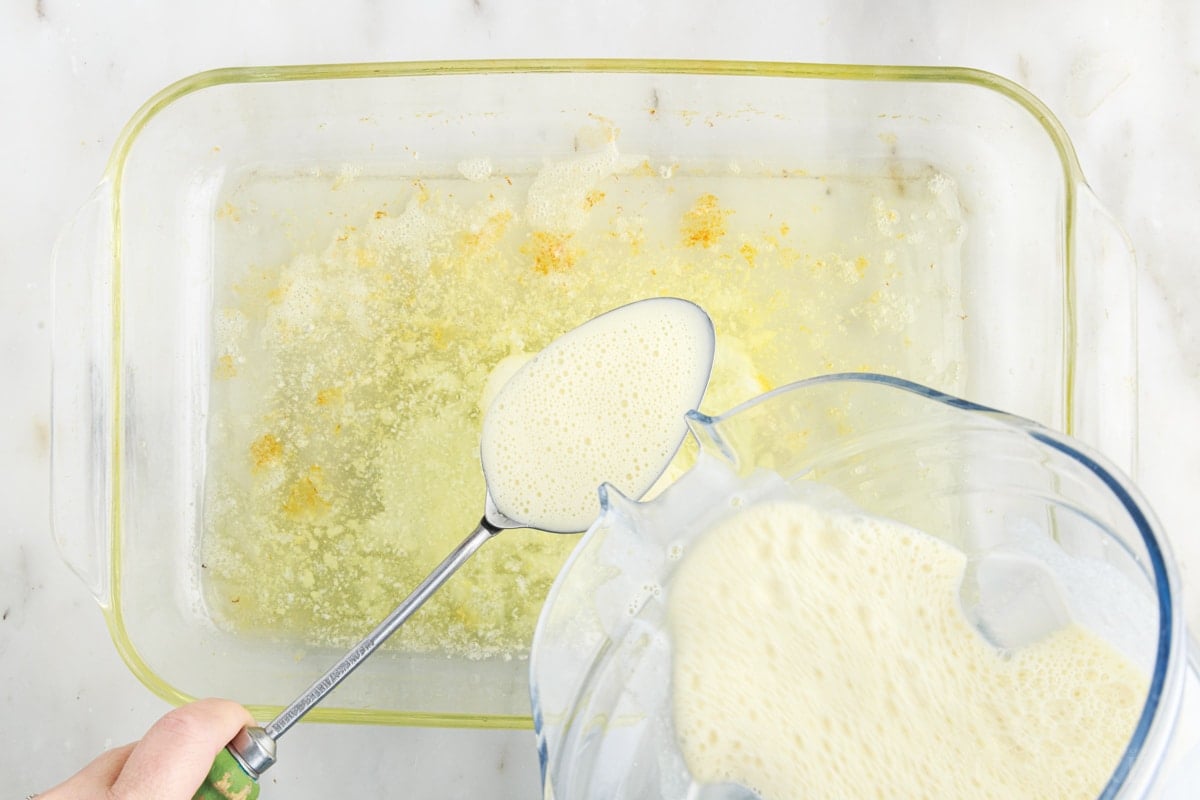
Step 4: Pour batter over a metal spoon into the melted butter.
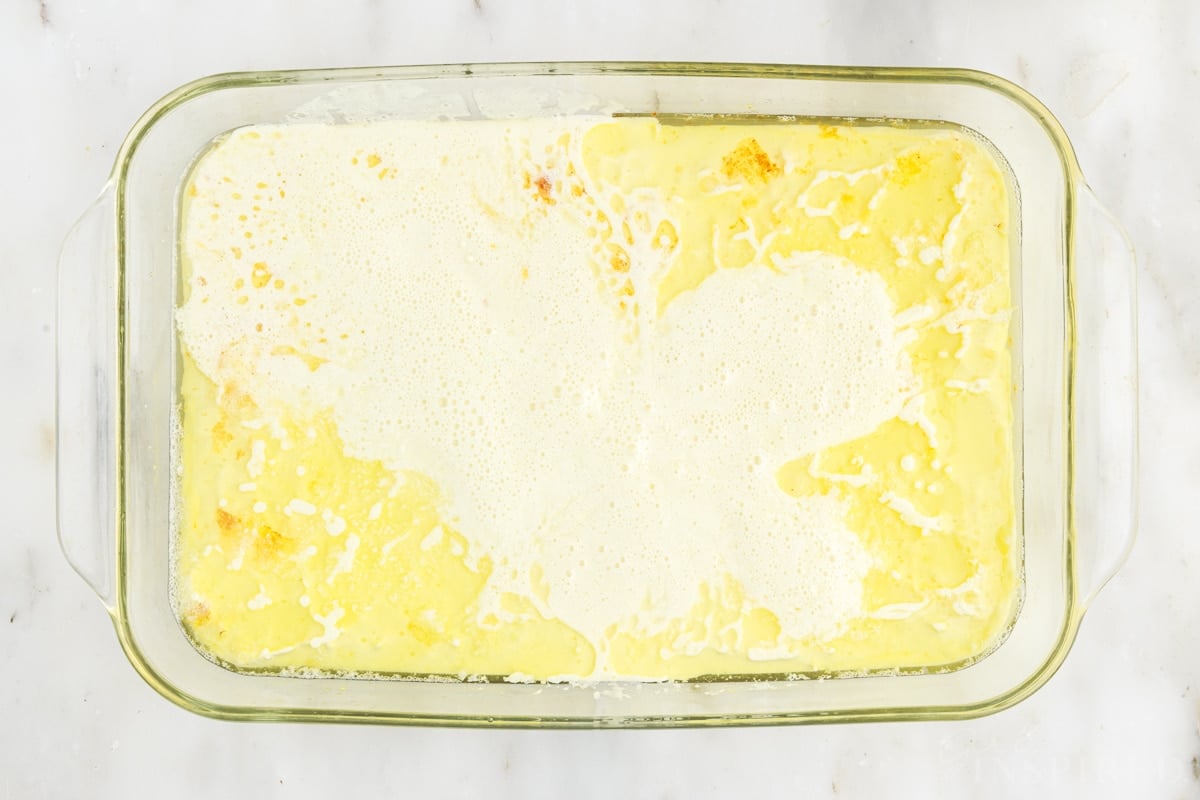
Step 5: Bake for 20-30 minutes, until the oven pancake is puffed and the edges turn golden brown. The base of the pancake will be dense and almost like a thick custard – an eggy texture.
GARNISH/SERVE: Sprinkle with powdered sugar, squeeze lemon juice over the pancake, or serve with berries and maple syrup. Note that the grand puffiness of the pancake will deflate shortly after removing it from the oven.
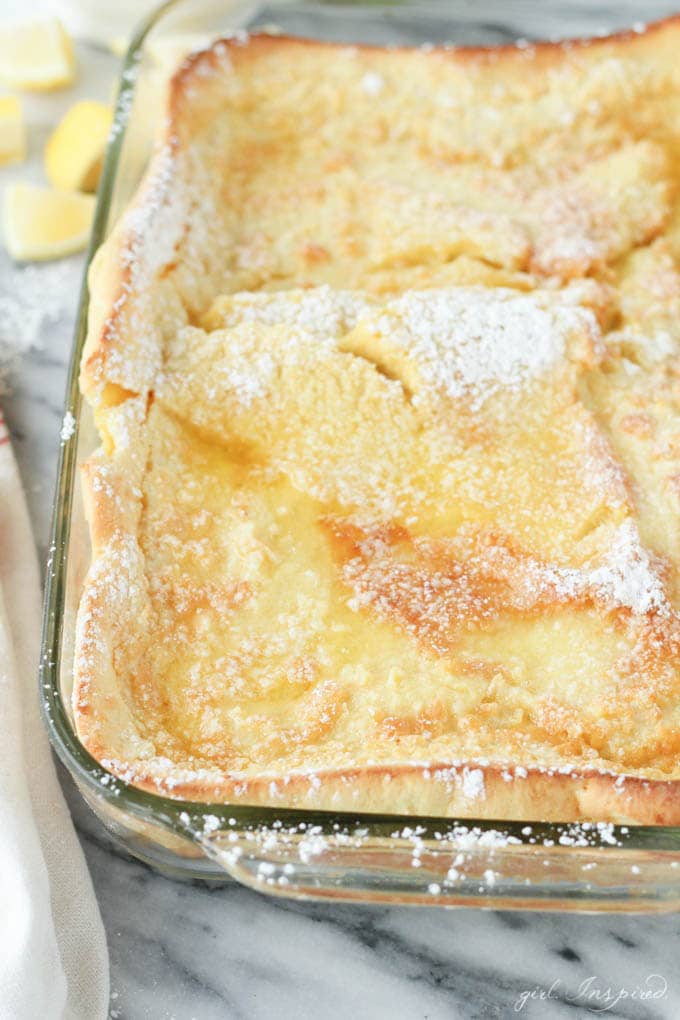
Recipe FAQs
With the rise in grain-free and gluten-free recipe needs, I have been asked a number of times if this oven pancake recipe can be made gluten-free. I’m here to tell you – YES!!! I simply substituted the all-purpose flour in the basic recipe with a gluten-free flour (I used the all-purpose gluten free rice/potato/tapioca flour from Trader Joe’s.)
Aside from puffing just a tad bit less than the traditional puffy german pancakes, the taste and texture of this gluten-free version is indistinguishable from the original version. We served this gluten-free version with our favorite combination of powdered sugar and lemon juice and even the kiddos thought it tasted exactly the same.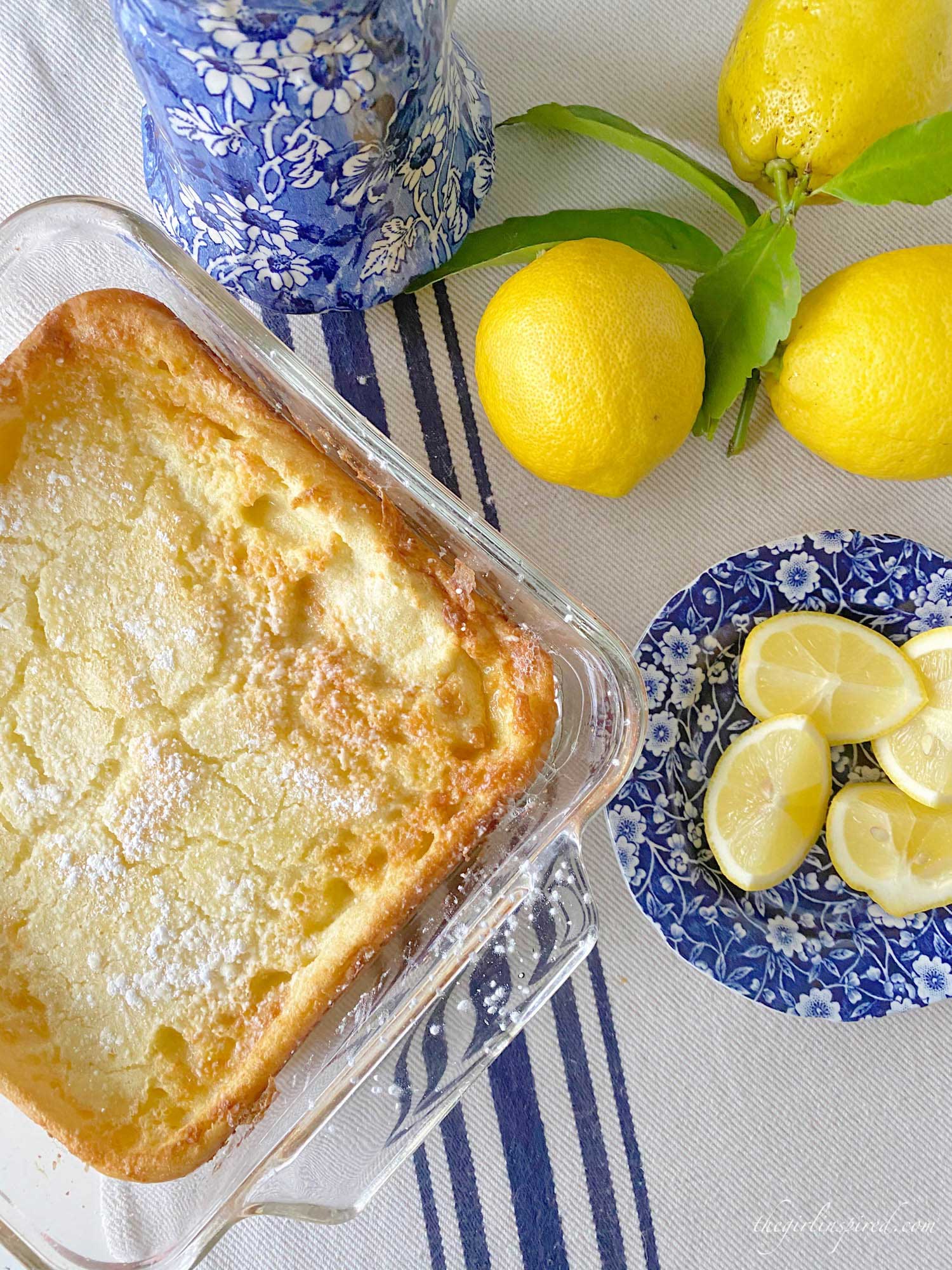
Okay, okay, I know that the traditional recipe has an entire stick of butter in it – you can see the delicious butter pooling on the top of the pancake and I, personally, think it’s absolute heaven! But the teeny tiny healthy voice in my head, as well as maaaannnnny a commenter, have cried for an oven pancake version with less butter. I HAVE HEARD YOUR CRIES! If you need to feel less guilty, you can simply reduce the amount of butter in the recipe. Cut it in half, reduce it down to even just a couple tablespoons. The puff pancake will still turn out golden brown and yummy, and your guilty conscience will back off a bit. (But I stand firm in that the butter makes this breakfast a true splurge in all the best ways!)
If you need to cut the butter completely out of this recipe, you can swap in the health community favorite – Coconut Oil.
As you can see in the photos, substituting coconut oil in this recipe still results in a gorgeous, golden brown German pancake with a huge degree of puff (more than usual, even). The flavor is still good – it’s just not buttery. Obviously. The texture remains the same, and you actually can use a whole lot less coconut oil – try just 2-4 tablespoons.
You will taste the coconut oil in the baked pancake, and as long as you like coconut flavor, this is a wonderful variation. I served the coconut oil version of this oven pancake with passion-fruit syrup and orange slices on the side and it was exquisite! So so delicious. 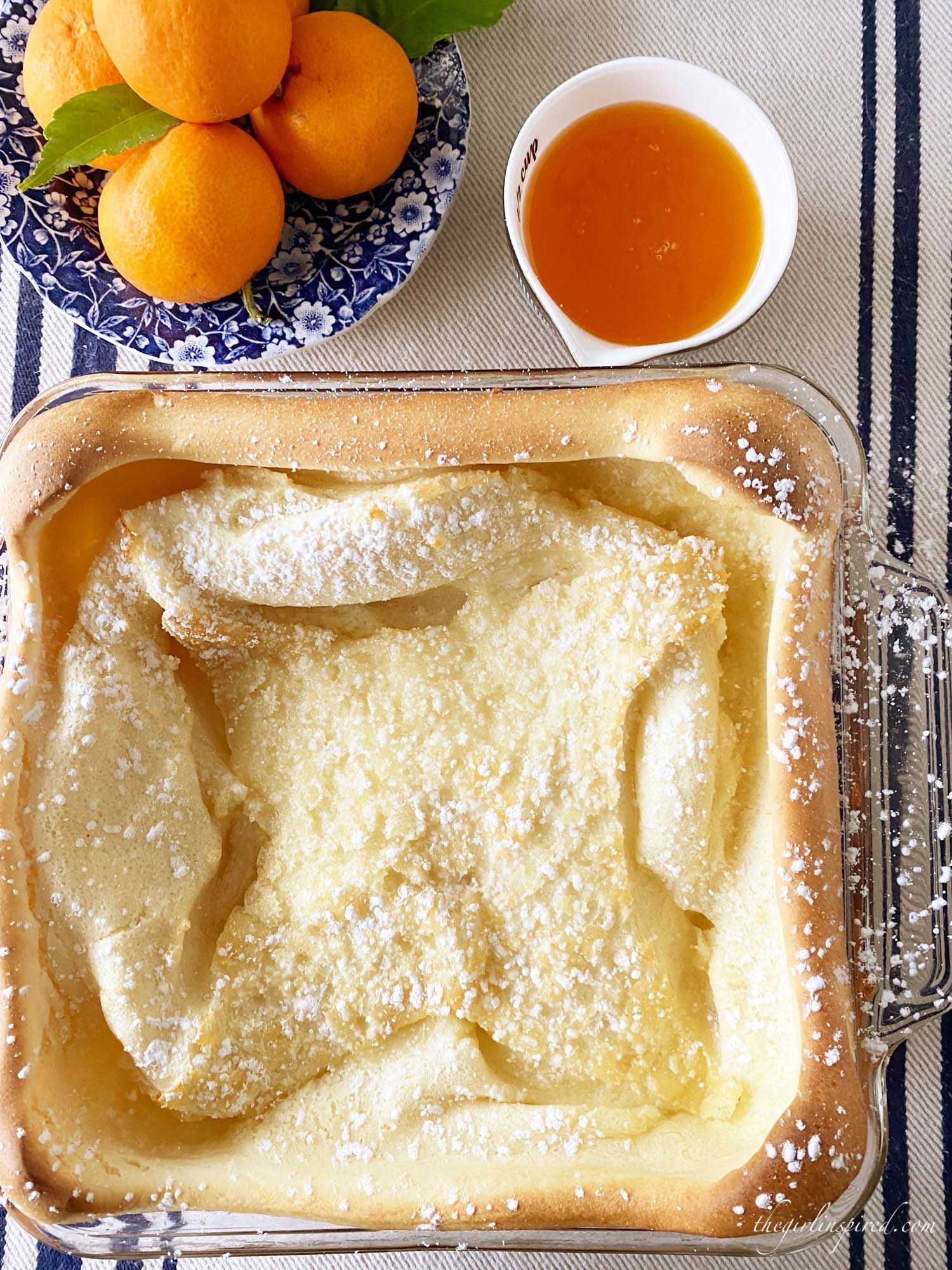
Of all the variations, substituting almond milk for the cow’s milk had the biggest impact of all. I did a straight swap without changing anything else in the recipe which means I did still use butter. If you need absolutely no dairy, try combining this version with the coconut oil version above. The German pancake did not puff as much, and the texture was less dense.
The pancake didn’t taste bad, and if you can’t drink cow’s milk, this dairy free version will work. I’m now curious how the recipe would turn out if I tried other types of milk. The almond milk did give the pancake a different flavor – and it no longer tasted right with my usual lemon and powdered sugar topping. However, serve this version with maple syrup and you have yourself a win.
Adding fresh fruit, fresh berries, or even fresh blueberries are a popular serving suggestion. I have had lots of people tell me that they make their German pancakes with apples and cinnamon baked in. I was excited to give this version a whirl. To make this recipe, follow all of the ingredients and instructions to make your basic oven pancake batter. Add in a bit of cinnamon if you wish. I also like some additional sugar. Peel and slice one to two apples and sprinkle them with cinnamon and sugar. Add them into the baking dish along with the butter as you are pre-heating the oven.
Once the butter has melted, proceed by pouring the batter over a metal spoon and into the prepared pan. Cook per the recipe until the pancake is puffy and golden brown. If you wish, sprinkle some sliced almonds over the top of the pancake during the last 10 minutes of baking. This apple German pancake was tasty and less sweet than some of the other versions. Consider topping with an extra dose of cinnamon sugar, some homemade buttermilk syrup, or a big heap of sweetened whipped cream!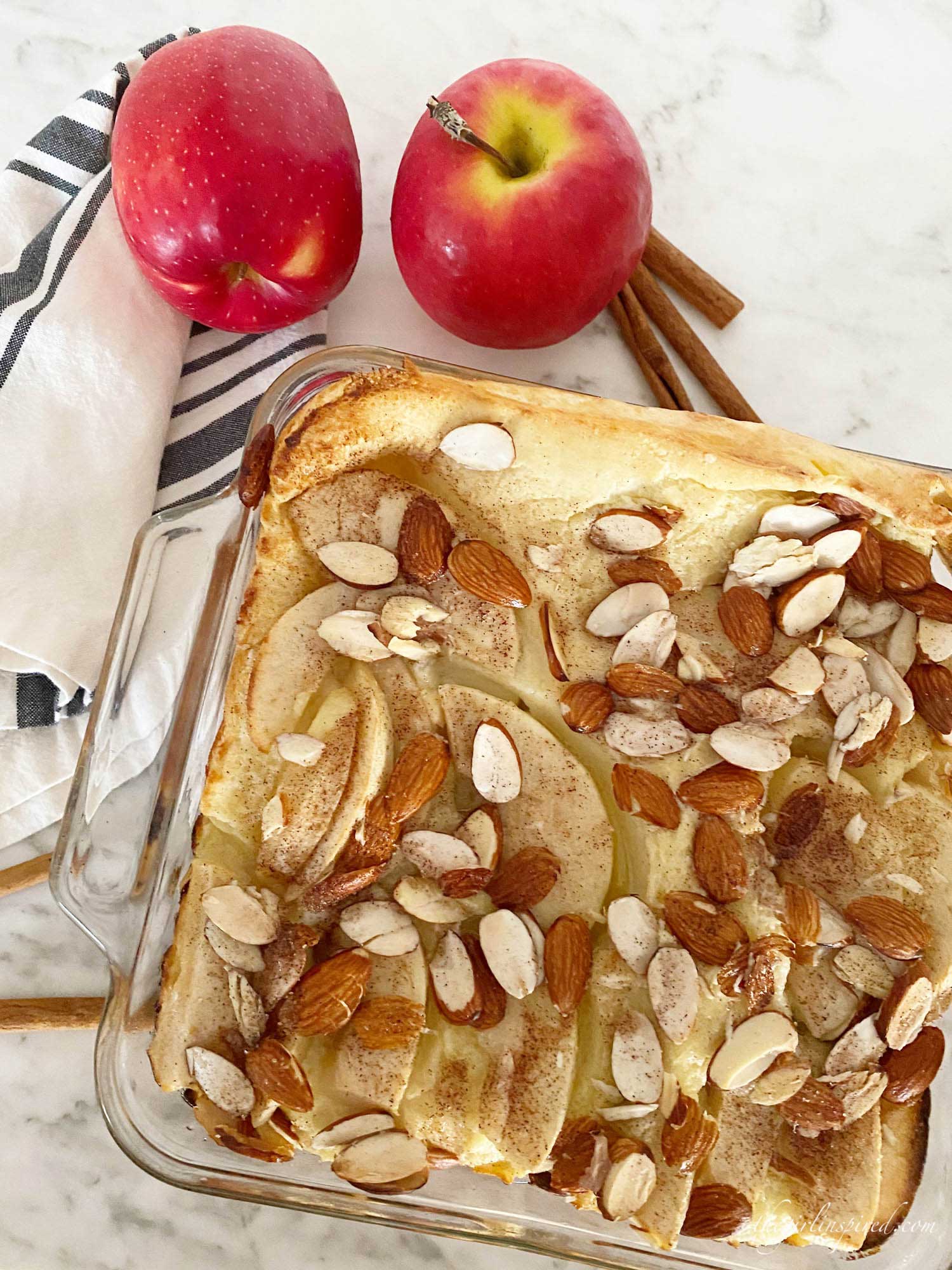
I’m not certain that anyone has a definitive answer to this common question. My recipe was passed down from my mother and although my maternal side immigrated from Germany, I don’t believe my recipe came from Germany. I think that what we make and call a German pancake nowadays is a recipe that was developed in America in the early 1900’s.
I’ve had many readers comment that yes, indeed, a German pancake is from Germany. Other readers who are German have never heard of such a thing. Essentially, the German Pancake is a large popover. These fluffy pancakes are a favorite among brunch recipes. It is very similar to a Yorkshire Pudding, but is made with butter rather than the traditional beef drippings. It probably has its recipe roots in Germany or Europe at large, but this version is more popular as an American recipe. Wherever its origins, it is a dish that spans generations and nationalities.
My understanding is that the term “Dutch Baby” came from an American restaurant owner. His little girl, unable to pronounce the word “Deutsche” (meaning German), began calling them Dutch babies and the name stuck. These pancakes are not from the Netherlands.
The butter and pan need to be hot when the batter goes in. This allows the pancake to rise and creep up the sides of the pan before the dry ingredients weight it down. If you want puffy pancakes, be sure to follow the steps for melting the butter and heating the pan. If you use a cast iron skillet, heat the butter then, too, for fluffy german pancakes. Using gluten free flour is another contributor to a less puffy batch of german pancake.
Do you make this breakfast at home? Do you call them something different like oven pancakes or German puff pancakes? I still would like to try cooking them on the stove top in a cast iron frying pan – maybe next time!
If you try these German Pancakes or any other recipe on my website, please leave a 🌟 star rating and let me know how you liked it in the 📝 comments below.
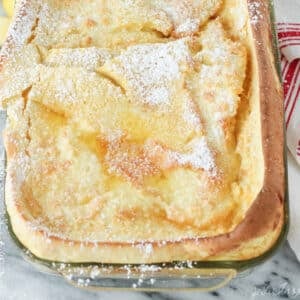
German Pancakes
Ingredients
- 2 cups whole milk
- 4 eggs large
- 1 teaspoon vanilla extract
- 1 ⅓ cup all-purpose flour
- 4 tablespoon granulated sugar
- ½ cup salted butter (melt in pan)
- 1 lemon for serving
- powdered sugar for serving
Instructions
- Place ½ cup butter in a heavy 9 x 13 glass baking dish.
- Set baking dish (with butter) in the oven and preheat to 400 degrees.
- In a blender, combine milk, eggs, vanilla, flour, and granulated sugar.
- When the butter is completely melted (before it browns or burns, though!), pour the batter over a metal spoon into the baking dish.
- Cook 30-40 minutes or until the pnacake is set in the middle and the edges are very puffy and golden brown.
- Remove from oven. Garnish with lemon juice and powdered sugar and serve immediately.
Would you like to save this?
Video

Notes
Nutrition
Make this recipe?
Share it with me on Instagram @girlinspired1 and follow on Pinterest for more!
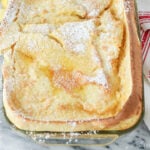
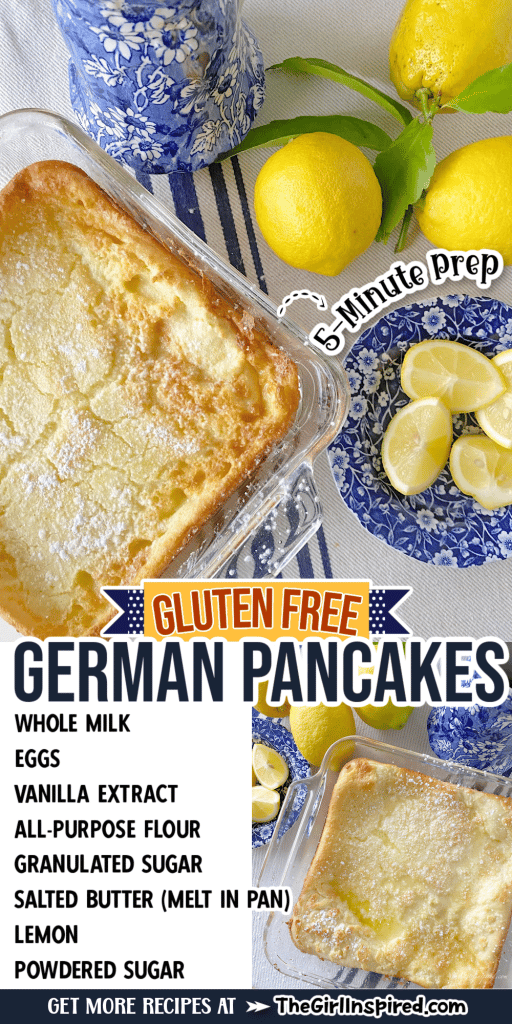
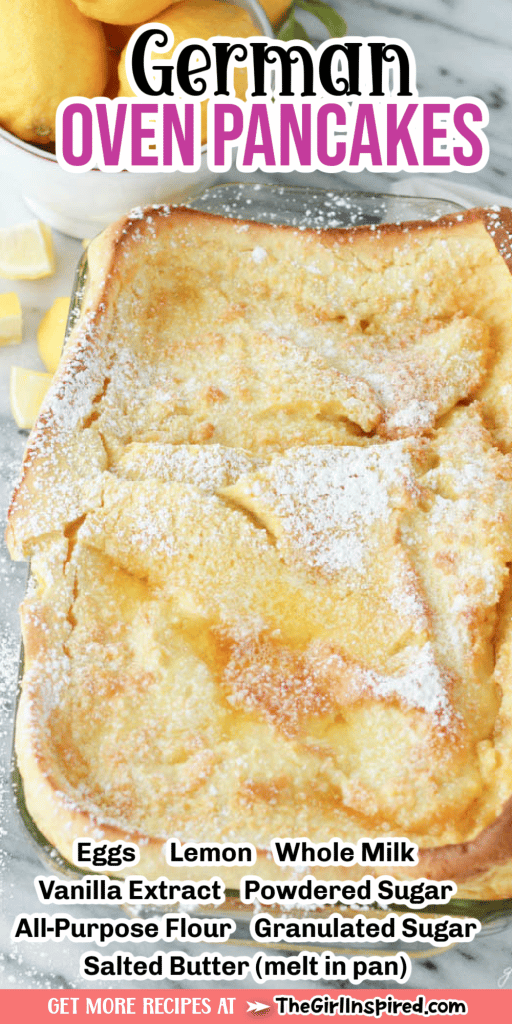
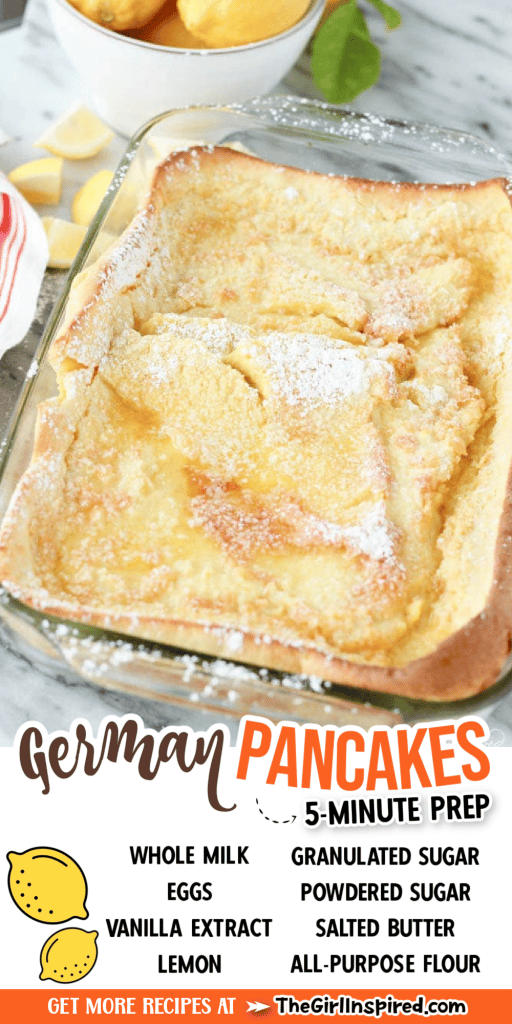
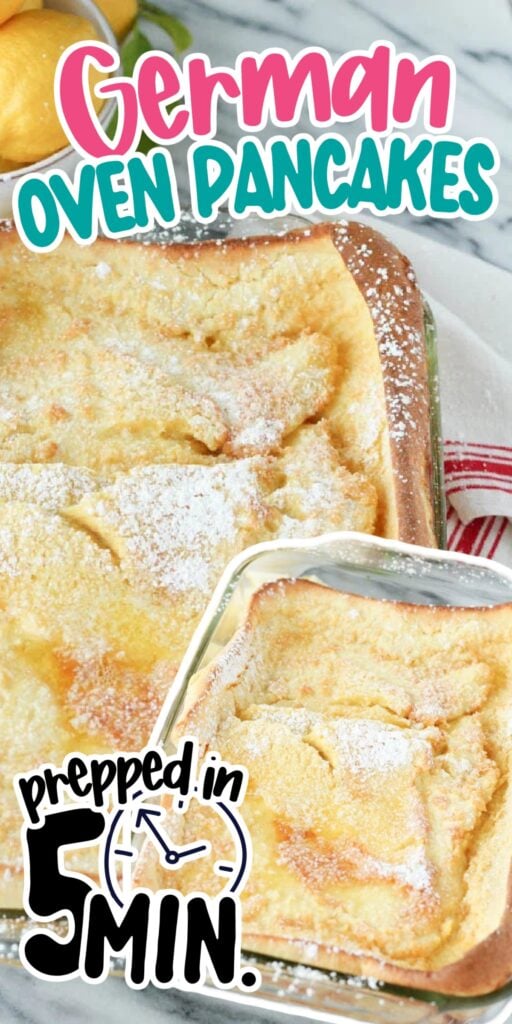
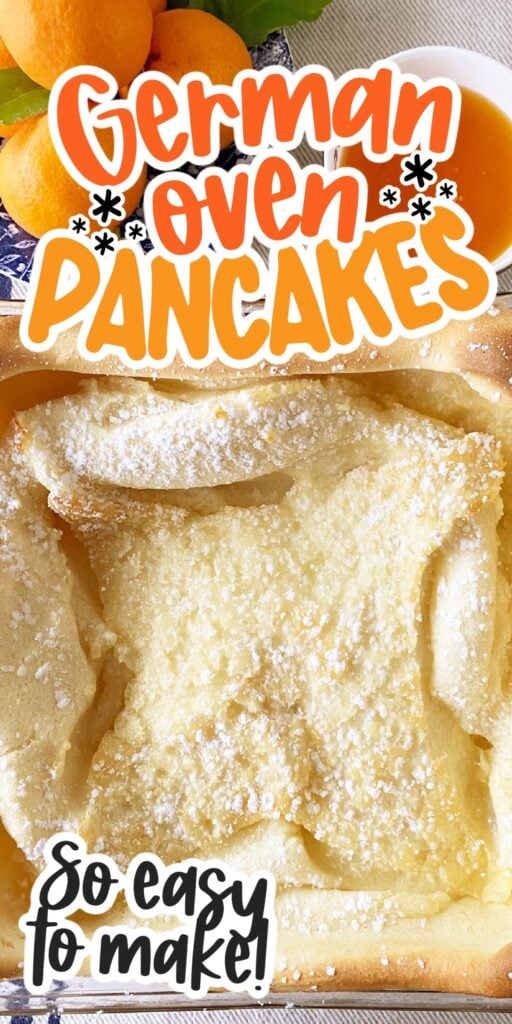
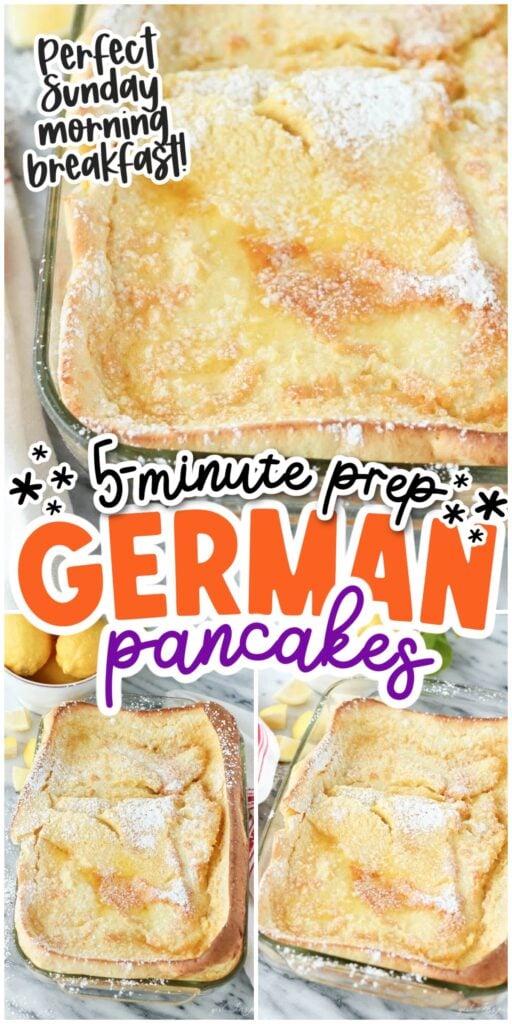
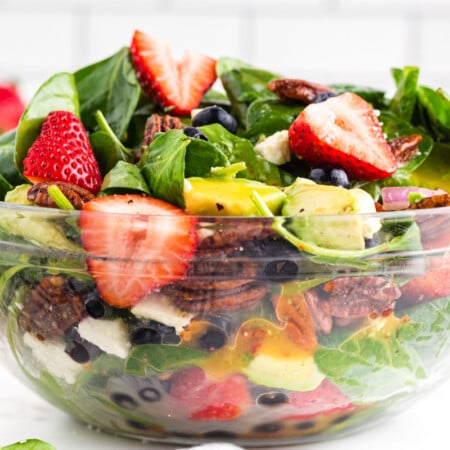
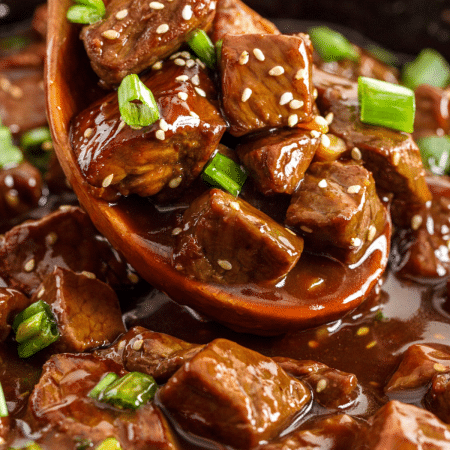







Comments & Reviews
Snezana says
I did not end up with 30-40 mins baking it took less about 20
Delish though. We make it all the time!!
Becky bohot says
excellent. so easy.
SM says
Followed directions exactly. So easy and turned out amazing! We had ours with some lemon curd and it was just wonderful.